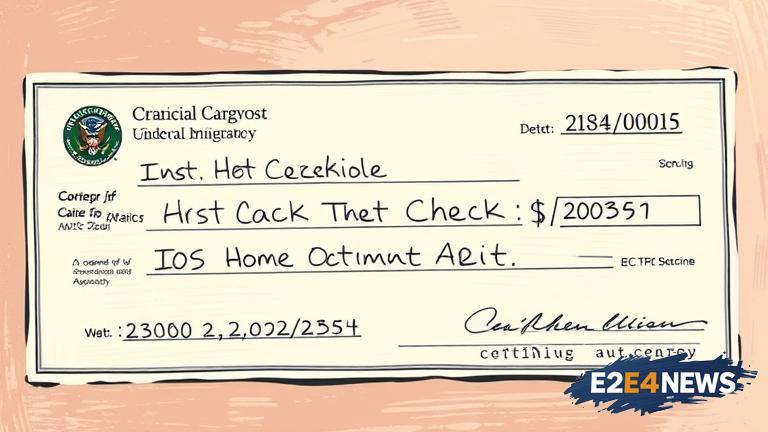The US Immigration and Customs Enforcement agency, also known as ICE, has been granted a massive blank check by the US government, sparking concerns over financial accountability and transparency. This move has been met with criticism from various quarters, with many arguing that it gives the agency too much power and flexibility to spend taxpayer money without proper oversight. The blank check, which is essentially a budget allocation without any specific spending limits or restrictions, has been described as mind-bogglingly massive by critics. The agency’s budget has been increasing steadily over the years, with some arguing that it has become a black hole for taxpayer money. The lack of transparency and accountability in the agency’s spending has raised concerns among lawmakers, advocacy groups, and the general public. Many are questioning how the agency plans to use the funds, and whether it will be used effectively to achieve its stated goals. The agency’s track record on financial management has been called into question, with some pointing to instances of wasteful spending and mismanagement of resources. The blank check has also raised concerns about the potential for abuse of power and the erosion of civil liberties. Some have argued that the agency’s increased budget and lack of oversight could lead to a surge in deportations and detentions, which could have a devastating impact on immigrant communities. Others have pointed to the potential for the agency to use the funds to expand its surveillance and enforcement capabilities, which could infringe on the rights of citizens and non-citizens alike. The issue has sparked a heated debate about the role of ICE in US society, with some arguing that the agency is necessary to maintain national security and public safety, while others see it as a symbol of a broken and inhumane immigration system. The blank check has also raised questions about the priorities of the US government, with some arguing that the funds could be better spent on other pressing issues such as healthcare, education, and infrastructure. The agency’s budget has been increasing steadily over the years, with some arguing that it has become a symbol of the country’s misguided priorities. The lack of transparency and accountability in the agency’s spending has also raised concerns about the potential for corruption and cronyism. Some have pointed to instances of contractors and vendors with ties to the agency’s leadership receiving lucrative contracts, which has raised questions about the integrity of the procurement process. The issue has sparked calls for greater oversight and accountability, with some arguing that the agency’s budget should be subject to regular audits and reviews. Others have called for the agency to be dismantled altogether, arguing that it has become a rogue agency that is unaccountable to the public. The debate over the blank check has highlighted the deep divisions in US society over issues of immigration, national security, and government accountability. As the issue continues to unfold, it remains to be seen how the agency will use the funds, and whether it will be able to demonstrate a clear and transparent plan for its spending. The US government has a responsibility to ensure that taxpayer money is being used effectively and efficiently, and that the agency is held accountable for its actions. The blank check has raised important questions about the role of ICE in US society, and the need for greater transparency and accountability in government spending. The issue has sparked a national conversation about the priorities of the US government, and the need for a more humane and effective immigration system. The US government must take steps to address the concerns raised by the blank check, and ensure that the agency is using taxpayer money in a responsible and transparent manner.





